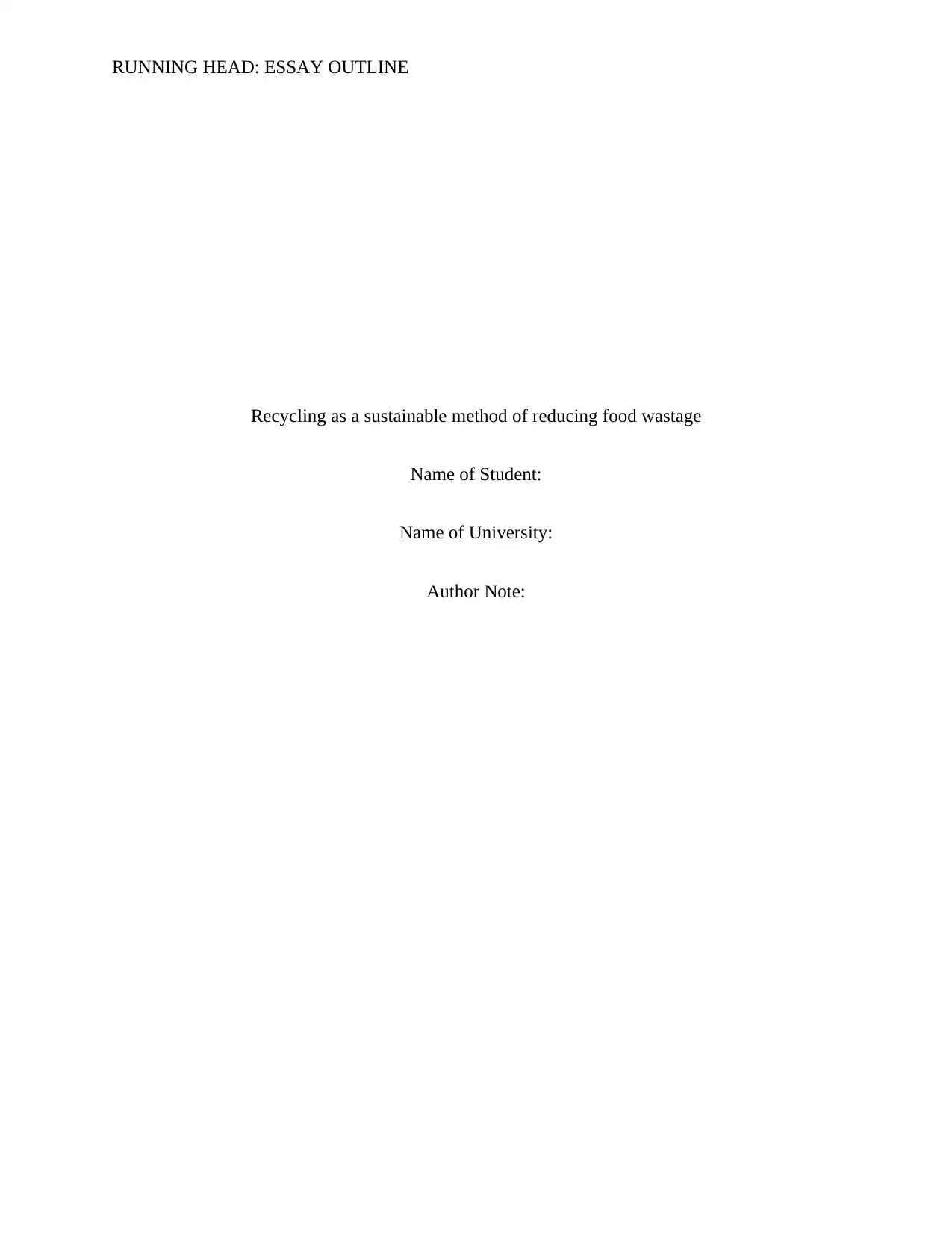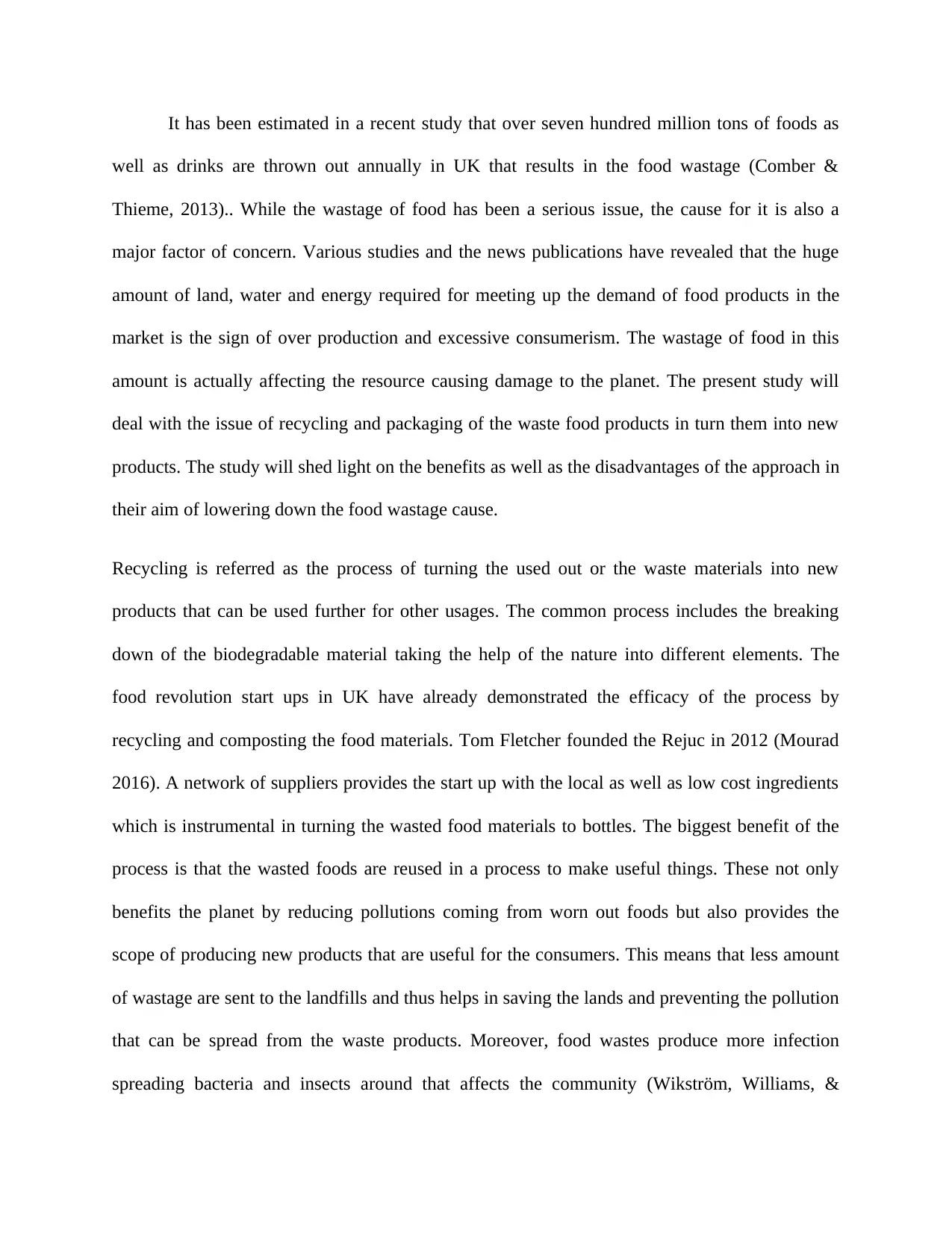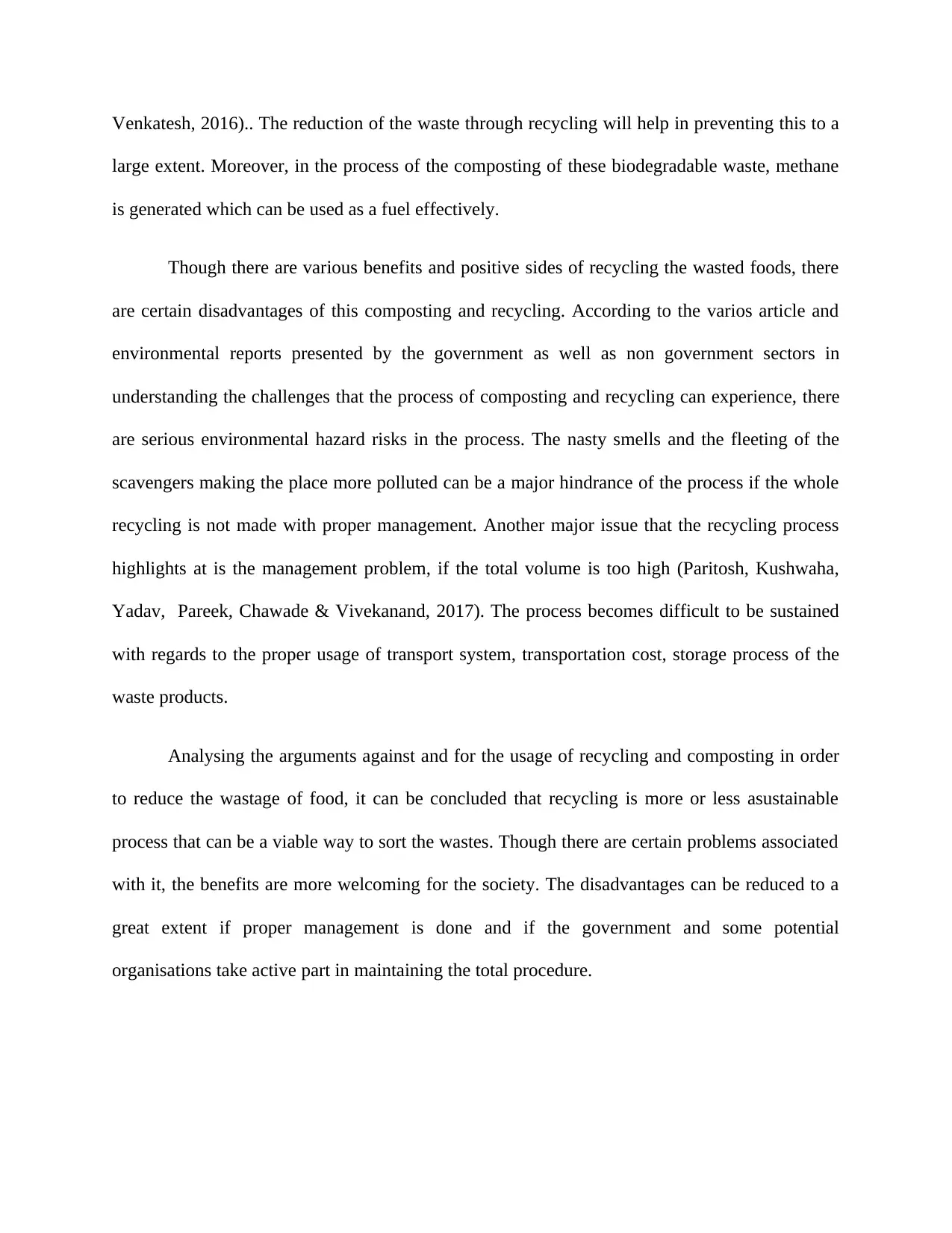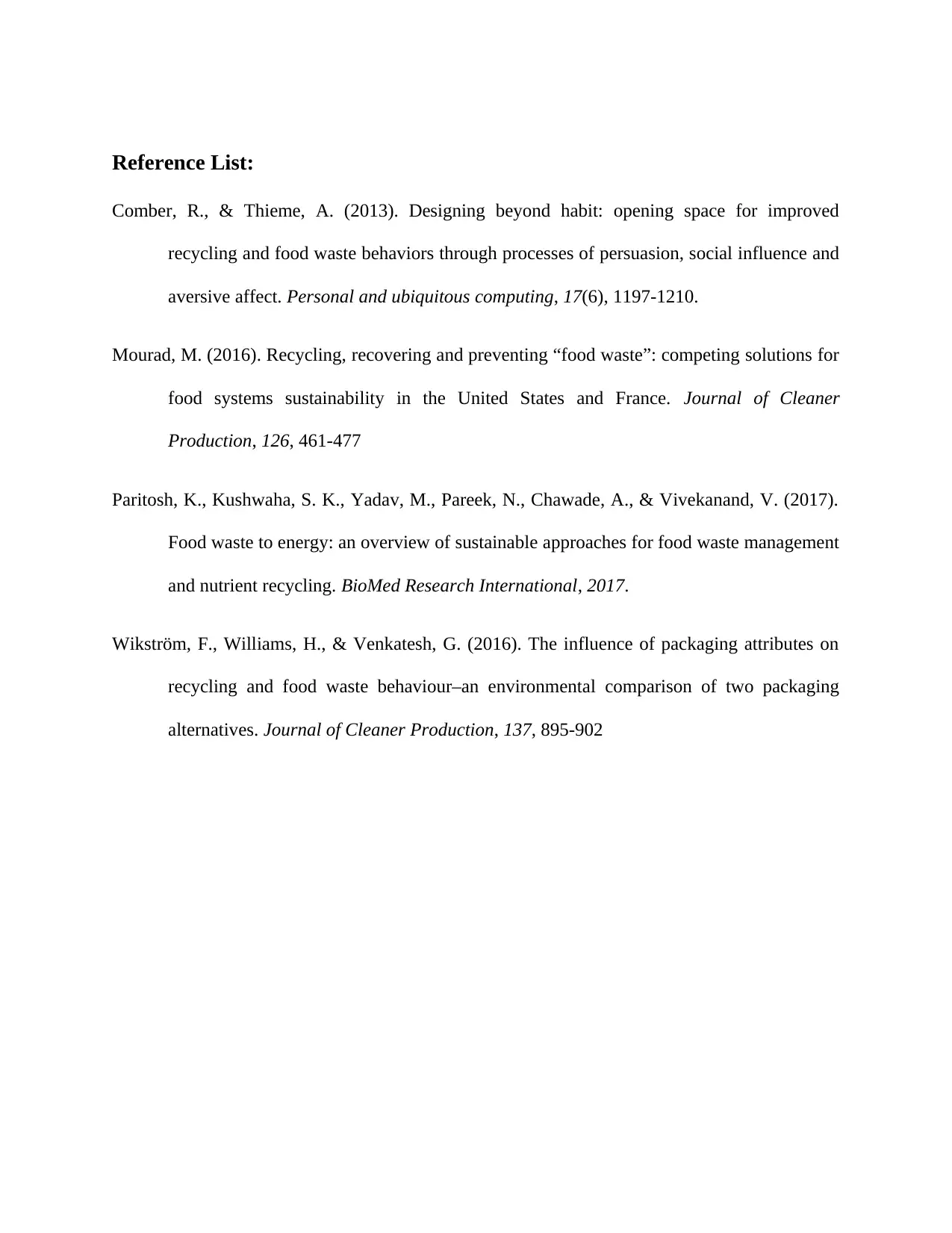Essay on Recycling as a Sustainable Method for Reducing Food Wastage
VerifiedAdded on 2022/08/22
|4
|902
|15
Essay
AI Summary
This essay examines the issue of food wastage and explores recycling as a sustainable method to address it. It begins by highlighting the significant amount of food waste generated annually and the environmental impact of overproduction and consumerism. The essay then delves into the process of recycling food waste, including examples of successful start-ups that convert waste into new products. It discusses the benefits of recycling, such as reducing pollution, creating new products, and preventing the spread of infections. However, the essay also acknowledges the disadvantages, including environmental risks from improper management and challenges in transportation and storage. The conclusion suggests that, despite some challenges, recycling is a viable and sustainable method for managing food waste, particularly with proper government and organizational support.

RUNNING HEAD: ESSAY OUTLINE
Recycling as a sustainable method of reducing food wastage
Name of Student:
Name of University:
Author Note:
Recycling as a sustainable method of reducing food wastage
Name of Student:
Name of University:
Author Note:
Paraphrase This Document
Need a fresh take? Get an instant paraphrase of this document with our AI Paraphraser

It has been estimated in a recent study that over seven hundred million tons of foods as
well as drinks are thrown out annually in UK that results in the food wastage (Comber &
Thieme, 2013).. While the wastage of food has been a serious issue, the cause for it is also a
major factor of concern. Various studies and the news publications have revealed that the huge
amount of land, water and energy required for meeting up the demand of food products in the
market is the sign of over production and excessive consumerism. The wastage of food in this
amount is actually affecting the resource causing damage to the planet. The present study will
deal with the issue of recycling and packaging of the waste food products in turn them into new
products. The study will shed light on the benefits as well as the disadvantages of the approach in
their aim of lowering down the food wastage cause.
Recycling is referred as the process of turning the used out or the waste materials into new
products that can be used further for other usages. The common process includes the breaking
down of the biodegradable material taking the help of the nature into different elements. The
food revolution start ups in UK have already demonstrated the efficacy of the process by
recycling and composting the food materials. Tom Fletcher founded the Rejuc in 2012 (Mourad
2016). A network of suppliers provides the start up with the local as well as low cost ingredients
which is instrumental in turning the wasted food materials to bottles. The biggest benefit of the
process is that the wasted foods are reused in a process to make useful things. These not only
benefits the planet by reducing pollutions coming from worn out foods but also provides the
scope of producing new products that are useful for the consumers. This means that less amount
of wastage are sent to the landfills and thus helps in saving the lands and preventing the pollution
that can be spread from the waste products. Moreover, food wastes produce more infection
spreading bacteria and insects around that affects the community (Wikström, Williams, &
well as drinks are thrown out annually in UK that results in the food wastage (Comber &
Thieme, 2013).. While the wastage of food has been a serious issue, the cause for it is also a
major factor of concern. Various studies and the news publications have revealed that the huge
amount of land, water and energy required for meeting up the demand of food products in the
market is the sign of over production and excessive consumerism. The wastage of food in this
amount is actually affecting the resource causing damage to the planet. The present study will
deal with the issue of recycling and packaging of the waste food products in turn them into new
products. The study will shed light on the benefits as well as the disadvantages of the approach in
their aim of lowering down the food wastage cause.
Recycling is referred as the process of turning the used out or the waste materials into new
products that can be used further for other usages. The common process includes the breaking
down of the biodegradable material taking the help of the nature into different elements. The
food revolution start ups in UK have already demonstrated the efficacy of the process by
recycling and composting the food materials. Tom Fletcher founded the Rejuc in 2012 (Mourad
2016). A network of suppliers provides the start up with the local as well as low cost ingredients
which is instrumental in turning the wasted food materials to bottles. The biggest benefit of the
process is that the wasted foods are reused in a process to make useful things. These not only
benefits the planet by reducing pollutions coming from worn out foods but also provides the
scope of producing new products that are useful for the consumers. This means that less amount
of wastage are sent to the landfills and thus helps in saving the lands and preventing the pollution
that can be spread from the waste products. Moreover, food wastes produce more infection
spreading bacteria and insects around that affects the community (Wikström, Williams, &

Venkatesh, 2016).. The reduction of the waste through recycling will help in preventing this to a
large extent. Moreover, in the process of the composting of these biodegradable waste, methane
is generated which can be used as a fuel effectively.
Though there are various benefits and positive sides of recycling the wasted foods, there
are certain disadvantages of this composting and recycling. According to the varios article and
environmental reports presented by the government as well as non government sectors in
understanding the challenges that the process of composting and recycling can experience, there
are serious environmental hazard risks in the process. The nasty smells and the fleeting of the
scavengers making the place more polluted can be a major hindrance of the process if the whole
recycling is not made with proper management. Another major issue that the recycling process
highlights at is the management problem, if the total volume is too high (Paritosh, Kushwaha,
Yadav, Pareek, Chawade & Vivekanand, 2017). The process becomes difficult to be sustained
with regards to the proper usage of transport system, transportation cost, storage process of the
waste products.
Analysing the arguments against and for the usage of recycling and composting in order
to reduce the wastage of food, it can be concluded that recycling is more or less asustainable
process that can be a viable way to sort the wastes. Though there are certain problems associated
with it, the benefits are more welcoming for the society. The disadvantages can be reduced to a
great extent if proper management is done and if the government and some potential
organisations take active part in maintaining the total procedure.
large extent. Moreover, in the process of the composting of these biodegradable waste, methane
is generated which can be used as a fuel effectively.
Though there are various benefits and positive sides of recycling the wasted foods, there
are certain disadvantages of this composting and recycling. According to the varios article and
environmental reports presented by the government as well as non government sectors in
understanding the challenges that the process of composting and recycling can experience, there
are serious environmental hazard risks in the process. The nasty smells and the fleeting of the
scavengers making the place more polluted can be a major hindrance of the process if the whole
recycling is not made with proper management. Another major issue that the recycling process
highlights at is the management problem, if the total volume is too high (Paritosh, Kushwaha,
Yadav, Pareek, Chawade & Vivekanand, 2017). The process becomes difficult to be sustained
with regards to the proper usage of transport system, transportation cost, storage process of the
waste products.
Analysing the arguments against and for the usage of recycling and composting in order
to reduce the wastage of food, it can be concluded that recycling is more or less asustainable
process that can be a viable way to sort the wastes. Though there are certain problems associated
with it, the benefits are more welcoming for the society. The disadvantages can be reduced to a
great extent if proper management is done and if the government and some potential
organisations take active part in maintaining the total procedure.
⊘ This is a preview!⊘
Do you want full access?
Subscribe today to unlock all pages.

Trusted by 1+ million students worldwide

Reference List:
Comber, R., & Thieme, A. (2013). Designing beyond habit: opening space for improved
recycling and food waste behaviors through processes of persuasion, social influence and
aversive affect. Personal and ubiquitous computing, 17(6), 1197-1210.
Mourad, M. (2016). Recycling, recovering and preventing “food waste”: competing solutions for
food systems sustainability in the United States and France. Journal of Cleaner
Production, 126, 461-477
Paritosh, K., Kushwaha, S. K., Yadav, M., Pareek, N., Chawade, A., & Vivekanand, V. (2017).
Food waste to energy: an overview of sustainable approaches for food waste management
and nutrient recycling. BioMed Research International, 2017.
Wikström, F., Williams, H., & Venkatesh, G. (2016). The influence of packaging attributes on
recycling and food waste behaviour–an environmental comparison of two packaging
alternatives. Journal of Cleaner Production, 137, 895-902
Comber, R., & Thieme, A. (2013). Designing beyond habit: opening space for improved
recycling and food waste behaviors through processes of persuasion, social influence and
aversive affect. Personal and ubiquitous computing, 17(6), 1197-1210.
Mourad, M. (2016). Recycling, recovering and preventing “food waste”: competing solutions for
food systems sustainability in the United States and France. Journal of Cleaner
Production, 126, 461-477
Paritosh, K., Kushwaha, S. K., Yadav, M., Pareek, N., Chawade, A., & Vivekanand, V. (2017).
Food waste to energy: an overview of sustainable approaches for food waste management
and nutrient recycling. BioMed Research International, 2017.
Wikström, F., Williams, H., & Venkatesh, G. (2016). The influence of packaging attributes on
recycling and food waste behaviour–an environmental comparison of two packaging
alternatives. Journal of Cleaner Production, 137, 895-902
1 out of 4
Related Documents
Your All-in-One AI-Powered Toolkit for Academic Success.
+13062052269
info@desklib.com
Available 24*7 on WhatsApp / Email
![[object Object]](/_next/static/media/star-bottom.7253800d.svg)
Unlock your academic potential
Copyright © 2020–2026 A2Z Services. All Rights Reserved. Developed and managed by ZUCOL.





